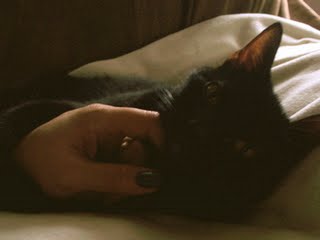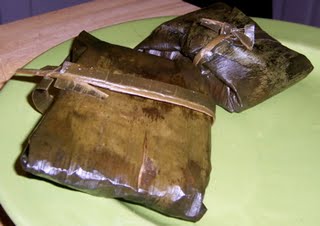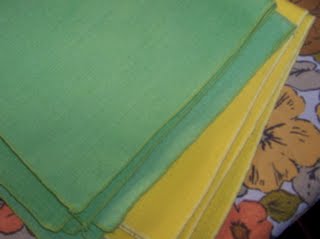
Call me crazy, but I've always thought Caravaggio's Judith didn't want to get
her hands dirty.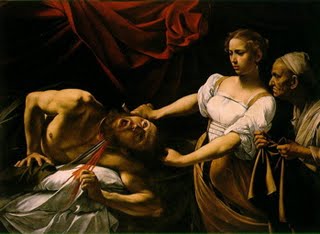
Let's
review:Yehudit (Judith) was a widow living in the city of Bethulia. The Assyrian King, Nabuchodonosor, sent his general Holofernes to punish the city. Holofernes went and cut off the water supply and laid siege to the city.
The city's elders were about to give up when Yehudit told them she had a plan. She went in her nicest clothes and jewelry to the camp of Holofernes. The general was taken with her beauty and invited her to a feast. Holofernes drank a lot of wine and got drunk.
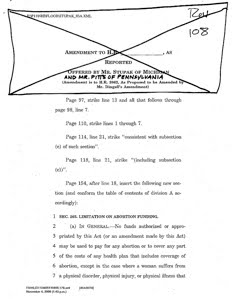 Yehudit went back to his tent and, when they were alone, and Holofernes was passed out from the alcohol, she took his sword and cut off his head.
Yehudit went back to his tent and, when they were alone, and Holofernes was passed out from the alcohol, she took his sword and cut off his head.
With the death of Holofernes, his army was in disarray and the Jews were able to mount an offensive and defeat the Assyrian army. The account of this story is in the book of Yehudit, which is part of the apocrypha and, while it was originally written in Hebrew, only the Greek version survived to be translated.All my life, men have given me knives. Perhaps I was the only one who didn't know why.
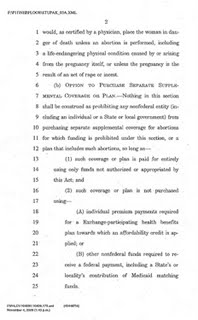
These are the words, just a few words. I'd count them like daisy petals:
He loves me. He loves me not. It always comes out even, though. Somehow, I find it in my heart to be surprised every time. Once I said to a man packing his bags to go, "You love you the most." Without blinking, he said, "Of course."
And that took away my breath.
In another life, I could sing the lives of the saints. In another life, after the ashes scattered in the wind, only the stories mattered. We don't listen to stories anymore. Stories interfere with the words we tell each other. We say words like
protection and
safety, when what we mean is
keep your distance and
love is infection.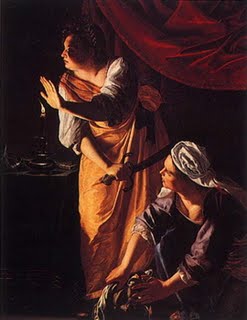
Artemesia Gentileschi understood Judith, because Artemesia was raped and painted with every enraged fiber of her being. This painting,
Judith And the Maid Servant With the Head of Holofernes, captures the fear of being trapped so viscerally that one might not at first notice the maid servant stuffing the bloody head into a bag. Judith is afraid but not ashamed.
In a dining room cabinet with a glass door sits a pile of pen knives. One, given to me by a woman who loved me but could not stay, is a tiny mermaid keychain. It is the kind of treasure one might easily overlook.
I am not trapped on the wrong side of any line. It does not make me brave to say so.

Let us be perfectly clear: the people we hear talking about healthcare reform are the people who will neither benefit from it, nor will they suffer. The voices we hear and the writers we read will lose nothing. They are almost uniformly wealthy, and nothing will touch them. Then, there's everyone else; there's us. We can talk to one another, but no one will hear us. Our words interfere with the stories.
One by one, we must cross into the enemy's tents and test our courage. Each of us must draw the knife. Each of us must find her own reason not to live in fear anymore. I myself will listen past the words to the stories, and I will not back down.
I am not afraid and I will stand my ground.

What, then, is this ground?
What is it?
In another life, I could sing the lives of the saints. In another life, only the stories matter. In my story, reproductive freedom is a concern of the distant past, but that's not the end of me.
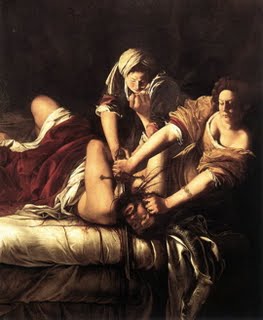
This law that limits the bodily autonomy of poor and middle class women - a fair-sized number of the people this law is supposed to help - will be enacted, if not word for word. It's going to kill women you and I don't know, but those women are real. Their stories matter, if not in the tangle of words.
I am sharpening my knives.
This evening, I looked around to see what an abortion costs. No one offered me anesthesia when I had mine, so I wasn't surprised to learn that it cost extra. Trust an old woman: pay it. From now on, I will never be without what it costs to prevent words from interfering with the stories of women around me. Make no mistake: this is not a conversation we should have to have, but we will. Because time has run out. Because words have come between us. Because I am sharpening all my knives.
Labels: This Never Happened To Pablo Picasso
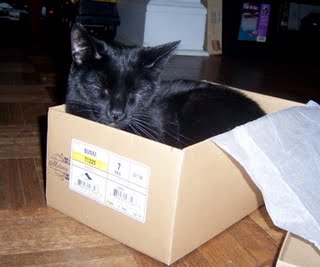 Never in my life have I personally been so frigging happy. Let's deal with that, shall we? Maybe it's the man, the food, the cats, the neighborhood, the job, the people - I can't say because I'm writing for shit and it's the middle of winter - but I am very happy, generally. Last week, I went to town meeting about sustainable living. One committee member said the schools aren't going to do something just because it's the right thing to do and I didn't punch her in the face because I've fucking matured. I take things in stride now. My hip is kicking my ass, making it tough to put on socks. I bought scuffs on sale for more than 50% off, causing me to do a cautious Happy Dance. Drusy got a box just the right size for a 6 lb. cat. Halle-freaking-lujah.
Never in my life have I personally been so frigging happy. Let's deal with that, shall we? Maybe it's the man, the food, the cats, the neighborhood, the job, the people - I can't say because I'm writing for shit and it's the middle of winter - but I am very happy, generally. Last week, I went to town meeting about sustainable living. One committee member said the schools aren't going to do something just because it's the right thing to do and I didn't punch her in the face because I've fucking matured. I take things in stride now. My hip is kicking my ass, making it tough to put on socks. I bought scuffs on sale for more than 50% off, causing me to do a cautious Happy Dance. Drusy got a box just the right size for a 6 lb. cat. Halle-freaking-lujah.

